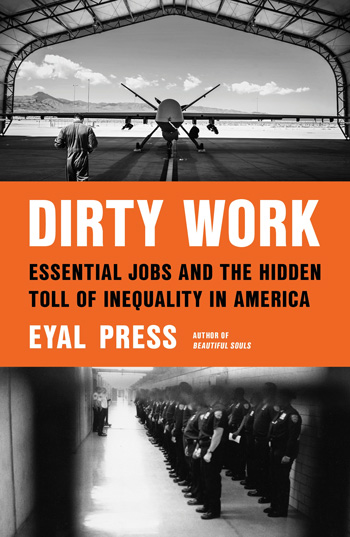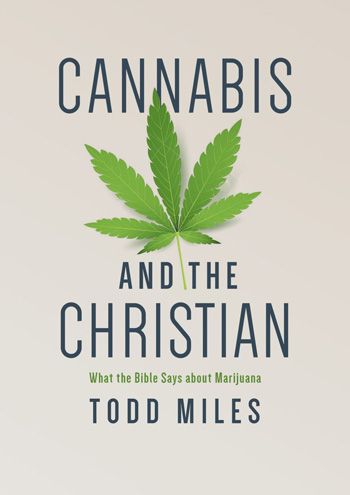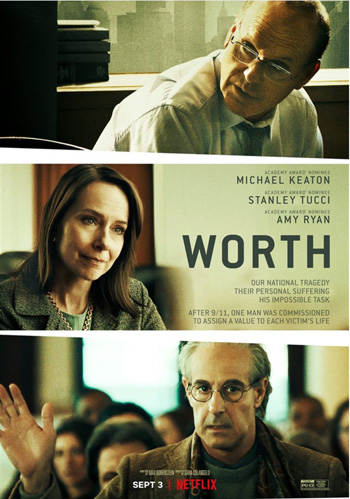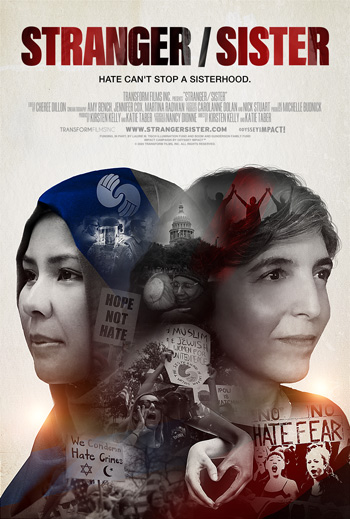Books

Dirty Work:
Essential Jobs and the Hidden Toll of Inequality in America
By Eyal Press
Farrar, Straus and Giroux, 2021 (320 pp., $18)
The debts we owe
Eyal Press begins his book with a quote from James Baldwin: “The powerless must do their own dirty work. The powerful have it done for them.” Press defines dirty work as unethical activity that society requires and silently condones. The book spotlights three groups of people filling that role: employees of prison mental health wards, combatants in the drone program, and workers in industrial slaughterhouses.
The key aspect of dirty work, Press writes, is that it depends on “a tacit mandate from the ‘good people,’ who see this work as a necessary part of the social order but don’t explicitly assent to it and can, if need be, disavow responsibility for it.” The workers have no such luxury, and the work they do takes a moral toll on them as they do it — and afterward, when they reflect on their actions.
Press interviews workers from the front lines, allowing them to share with the reader details about what they saw and did, the feelings they have about it, and the impact it has had on their lives. These are shockingly personal portrayals of real humans doing work we almost never hear about in first-hand accounts.
At its core, this book is about inequality. Press highlights the people who toil almost invisibly, undertaking the most objectionable duties of keeping society running smoothly. In doing so, he reminds us of society’s — and our own — debt to them.

Cannabis and the Christian:
What the Bible Says about Marijuana
By Todd Miles
B&H Books, 2021 (176 pp., $12.99)
In the beginning: Moral perspectives on pot for the religious-minded
With marijuana now fully legal in 18 states — and decriminalized or legal for medicinal use in 25 more — Todd Miles takes up the question of how thoughtful Christians should respond to this reality.
Miles, a professor of theology at Western Seminary in Portland, Oregon, is convinced that the church has some catching up to do on this topic. While pastoral leaders previously would have advised church members to just follow the law, sweeping legal changes over the past decade require churches to reassess that guidance.
The book starts with the science behind marijuana and its affects. Miles then delves into what the Bible has to say about intoxication and how that may or may not apply to pot. Later chapters consider discipleship, suffering, thinking biblically about medical marijuana, and a Q&A for pastors and parents.
Miles sets out a framework of questions with which to consider moral issues that do not specifically appear in the Bible. He acknowledges that readers already have their own views on the topic, and some will think his view is too restrictive while others will think it too permissive. Ultimately, he encourages readers to evaluate his interpretation of scripture to determine whether his recommendations are sound.
Films

Worth
Directed by Sarah Colangelo
118 minutes
What price life? Finding grace in the uncertain calculus of victim compensation
A dramatization of the creation of the Sept. 11 Victim Compensation Fund, Worth follows Kenneth Feinberg (Michael Keaton), special master of the fund, and his colleagues as they meet with survivors of 9/11 victims and determine the compensation amounts they can receive. Charles Wolf (Stanley Tucci), whose wife perished in the Twin Towers attack, articulates problems with the process early on, rallies his fellow survivors to push back on the initial offers they receive, and challenges Feinberg’s team to “Fix the Fund.” What starts with actuarial tables and a rubric ultimately reaches, for Feinberg, a place of advocacy and compassion. The film wrestles with issues of fairness, justice, grief, the limits of policy formulation, and the question of what life is worth. Available on Netflix.

Stranger/Sister
Directed by Kirsten Kelly & Katie Taber
39 minutes
Solidarity in an uncommon sisterhood
Two New Jersey women, one Muslim and one Jewish, banded together in 2010 with a goal of transforming distrust and division into understanding and solidarity. The connection between Atiya Aftab and Sheryl Olitzky has since blossomed into the Sisterhood of Salaam Shalom, a network with thousands of members across North America. This documentary chronicles the activities of chapters in Chicago, Austin, and elsewhere. Filming began shortly after the 2017 Muslim Ban and continued for three years. Their work to build bridges, challenge assumptions, and stand up against hate in their communities is slow, deliberate, and often uncomfortable — but also full of shared prayer, intentional friendships, and empowering grace. Request a screening at strangersister.odyssey-impact.org.
What are you reading and watching? Do you have a book or film to recommend? Drop us a note at editors@intrust.org.